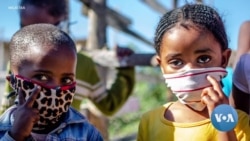Starting in late March, South Africa has had one of the most rigorous COVID-19 lockdowns in the world. At Level 5, all air travel was grounded and all non-essential businesses, such as restaurants, salons and tourism operators were required to cease all operations. Residents were required to stay home at all times with limited exemptions for trips only to the grocery store, pharmacy, or a doctor.
That included many international visitors, who are now stuck in South Africa for the foreseeable future. VOA talked to Paulina Migalska, an American tourist who leveraged her involuntary Cape Town visit extension into a valuable partnership with a local artist to help locals in a township.
Arrival in South Africa
Paulina Migalska, a 39-year-old entrepreneur in international development field from Boston, arrived in Cape Town in mid-February on a three-month tourist visa. The first case of COVID-19 in South Africa was reported on March 5, but it wasn’t until much later in the month that South Africans began to fully understand the danger associated with the coronavirus. Scheduled to depart in early April, and not yet fully grasping the severity of the situation, Migalska went on a street art tour of Khayelitsha township, one of the top five largest urban shanty towns of the world, which is famous for its vivid mural art.
In South Africa, the phrase “township” typically refers to an underdeveloped and racially segregated urban area where the Apartheid government, which ended by 1994, would relegate Black and other people of color. Migalska observed that the pre-1994 segregated paradigm of Cape Town’s neighborhoods and suburbs remains to a large extent today. It was there Migalska met Juma Mkwela, a local artist turned activist and founder of “Juma Art Tours.” She was one of Juma’s last guests before the lockdown.
Helping hand during lockdown
When the South African government announced the lockdown, Migalska re-connected with Mkwela and asked if it would be helpful for her to sew fabric masks for residents who cannot afford to buy one. Mkwela said “absolutely,” and a race against time began before everything shut down for months. Migalska spent the last 24 hours prior to the lockdown purchasing fabric and borrowing a sewing machine from a friend’s mother, Sophia Wippenaar, a former seamstress.
Mkwela told VOA, many residents of Khayelitsha and other township areas in Cape Town live in crowded single-room dwellings constructed of corrugated steel and other materials, making social distancing close to impossible, and mask-wearing that much more important.
Before Migalska’s maskmaking idea, Mkwela had asked her to help raise money to support Khayelitsha families. Through that campaign they helped more than 40 families, who received food supplies and face masks throughout April and May. Mkwela says “I believe that everyone that travels (here), there's always a way that you want to meet locals. So, I play a role in a way that I connect visitors and locals.” So far, they have given out 400 masks and are working on 50 more.
Sexy Socks
During the strict lockdown one issue arose: distribution. That’s where Sexy Socks came in, a local Cape Town social enterprise, which provided MIgalska with a special “essential services permit” so that she could join Mkwela on trips to Khayelitsha to donate the masks. Founded by Dave Hutchison, Sexy Socks donates a pair of colorful socks to a child in need for every pair sold. Hutchison also turned to donating masks instead of socks. “Part of the ideas is, we gotta give some back, she (Migalska) had the perfect avenue to market it. So, it’s really just coming together of a number of lucky events,” Hutchison told VOA.
Mkwela describes meeting Migalska as a lucky event, and Migalska describes going to Juma Art Tours in Khayelitsha as a lucky event, but the biggest lucky event was the wedding of Pamela, Migalska’s sister and Hutchison on February 29, which brought Migalska and guests from 25 countries to Cape Town for the leap year festivities.
Migalska remains unlucky in attempts to return home to Boston in the U.S. state of Massachusetts. Although the lockdown is at Level 3, commercial flights remain grounded. Her flights have been rescheduled three times, and there are no flights until September, making her the only visiting wedding guest remaining in Cape Town. Her tourist visa is expired but she says she “feels safe in this strict lockdown, especially as compared to back home in America.”





